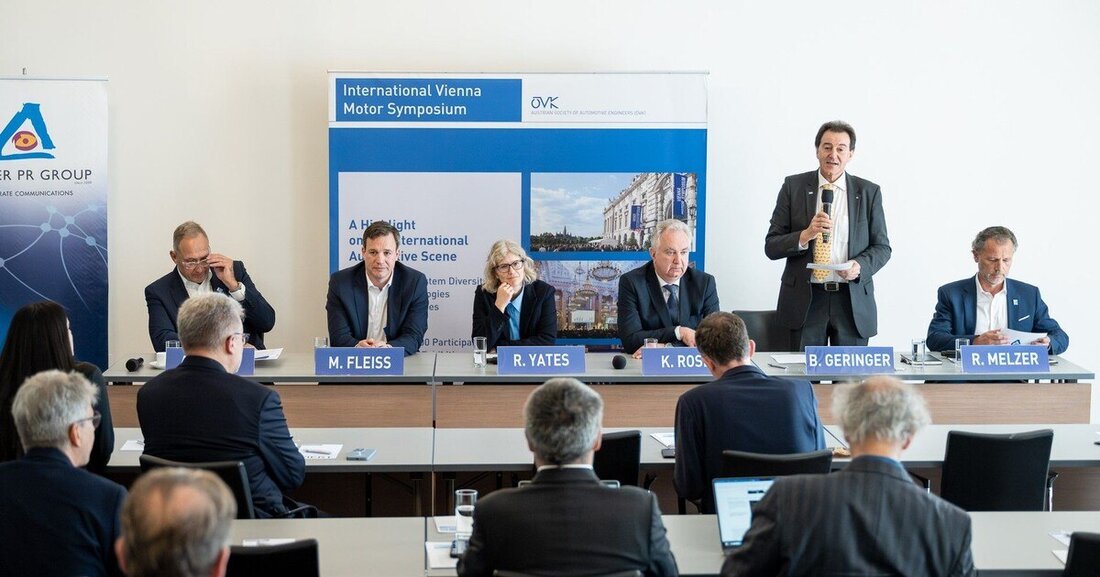A replacement for petroleum is required
At the Vienna Engine Symposium, experts discussed how around 30 million barrels of oil per day could be replaced.

A replacement for petroleum is required
“The automotive industry is in one of the most challenging phases in its more than 140-year history,” explained Helmut List, CEO of Graz AVL List. The speed at which both innovations and technologies come onto the market has increased. In addition, fluctuations in customer behavior as well as in the legal and market policy framework made business more difficult to plan. A billion-dollar investment in a gigafactory for batteries could quickly become obsolete if, for example, better cell chemistry is developed somewhere in the world. And battery development is only just beginning, many experts emphasized. For Karl Rose, the former chief strategist of the oil company ADNOC (Abu Dhabi National Oil Company), “batteries are the oil of the future”. Rose is convinced that Europe, America and China will have electrified private transport in 2050. However, when it comes to batteries, Europe is falling behind year after year compared to the USA and Asia, where significantly more is being invested in them.
The VW Group wants to at least reduce its dependence on battery cell suppliers. Battery cells account for around 40 percent of the value of an electric car. “Our goal is to produce 50 percent of our battery cells ourselves,” explained Michael Steiner, Chief Research Officer at Volkswagen AG. In order to achieve the next technological leap, VW is intensifying its collaboration with suppliers in the area of solid-state cells. This is considered to be quicker to charge, has a longer range, is more reliable, longer lasting and safer than current lithium-ion cells. Overall, Steiner expects that the costs of battery cells will fall by up to 40 percent by 2035. However, the transition to battery-electric mobility is taking place much more slowly than many car manufacturers expected. The reasons for this range from an inadequate power grid to high vehicle costs and inadequate charging infrastructure. Rose pointed out that almost two thirds of the charging stations in the EU are concentrated in three countries. These are the Netherlands, Germany and France. Rose sees electric vehicles having a noticeable impact on global oil demand, with a decline of 1.5 million barrels (159 liters) per day after 2030. Overall, global production is currently around 100 million barrels of crude oil per day, around a third of which goes into transport. Oil companies like BP began making the transition years ago, said Rebecca Yates, Vice President of BP in Vienna. “BP’s goal is to become a net zero carbon company by 2050 or even sooner.” By 2030, BP's strategic goal is to increase the number of charging points from the current 27,000 to 100,000 worldwide.
From Franz von Mahle's point of view, synthetic fuels should not be left out. These e-fuels are produced based on green hydrogen and CO2, which is split off from industrial exhaust gases. Due to the more complex production, they are more expensive and have a worse energy balance than the direct use of green electricity in batteries. But they have important advantages: E-fuels are often seen as the best way to decarbonize areas such as container shipping or long-haul air traffic. In contrast, the potential for biofuels as a replacement for fossil energy sources in transport is considered limited, as competition with food production should be avoided. E-fuels including green hydrogen are also attractive as storage for green electricity. This means that green electricity, where Europe will be very dependent on imports, can be transported over very long distances just as easily as crude oil. “The share of fossil energy sources in primary electricity in Europe is still almost 40 percent,” said ÖVK boss Bernhard Geringer. For primary energy it is much higher.
CO2-neutral fuels are also seen as having great future potential for cars. All the more so as there is no ban on internal combustion engines in cars outside of Europe. Growth is even expected, especially in emerging countries like India. With sustainable fuels, cars can also run emission-free if the overall ecological balance of the car is taken into account and not just the exhaust gas from the exhaust system. And it's much cheaper than with battery-electric drives, explained Michael Fleiss, managing director of the drive developer Aurobay Europe. According to a Bloomberg study, there will be 900 million combustion vehicles and 600 million battery vehicles on the road worldwide in 2040, said Fleiss. Aurobay was founded in 2021 and includes the combustion division (from development to production of engines and transmissions) of the Chinese car manufacturer Geely, its European subsidiary Volvo. A joint company with Renault's combustion engine division is planned for this year. “This will then be the largest independent powertrain manufacturer in the world, producing five million powertrains worldwide every year.” The company will also develop and build modern combustion engines and transmissions for other international car manufacturers who can no longer afford to develop their own engines and want to concentrate fully on battery-electric drives.

 Suche
Suche
 Mein Konto
Mein Konto